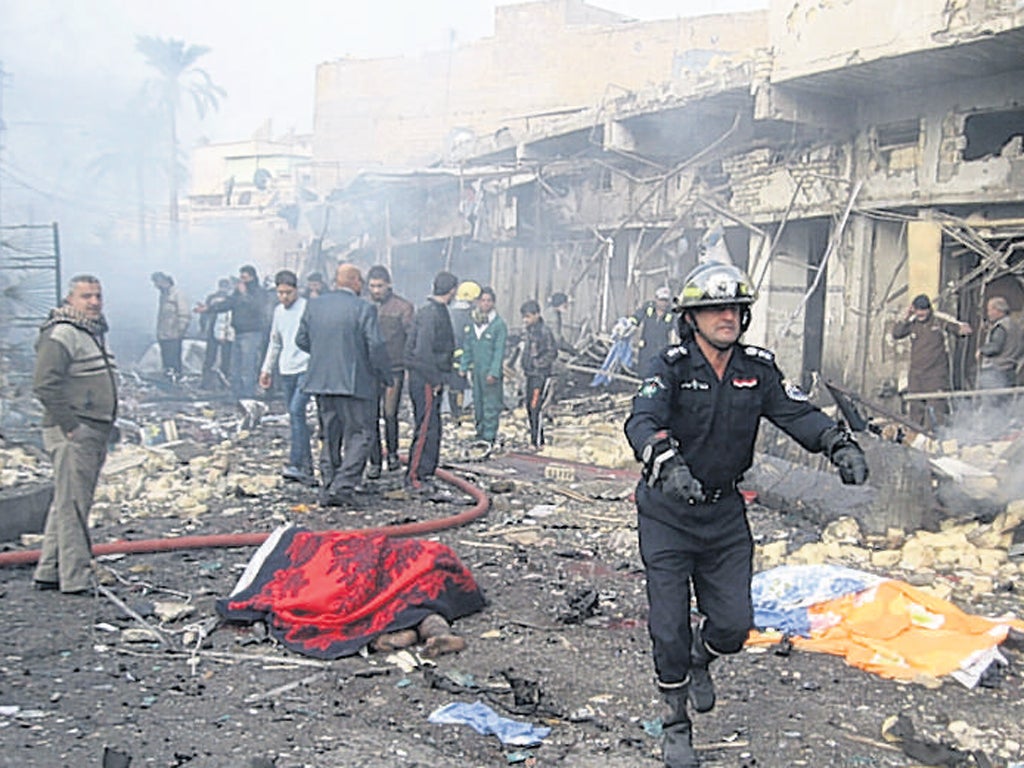Bomb attacks leave 70 dead across Iraq as Shia are targeted
The Prime Minister Nouri al-Maliki created a political crisis by turning on Sunni leaders

Your support helps us to tell the story
This election is still a dead heat, according to most polls. In a fight with such wafer-thin margins, we need reporters on the ground talking to the people Trump and Harris are courting. Your support allows us to keep sending journalists to the story.
The Independent is trusted by 27 million Americans from across the entire political spectrum every month. Unlike many other quality news outlets, we choose not to lock you out of our reporting and analysis with paywalls. But quality journalism must still be paid for.
Help us keep bring these critical stories to light. Your support makes all the difference.
Bomb attacks in mainly Shia Muslim areas of Iraq killed more than 70 people and wounded scores yesterday, police and hospital sources said, demonstrating increased sectarian strife across the country.
The largest single attack was beside a police checkpoint west of Nasiriya in the south, where a suicide bomber targeting Shia pilgrims killed 44 people and wounded 81, said Sajjad al-Asadi, the head of the provincial security committee in Nasiriya. Photographs showed relatives hugging the bodies of young men lying face down on the ground covered in blood and with the pilgrims' belongings strewn around them.
Hundreds of thousands of Shia pilgrims are expected to make their way to the holy city of Kerbala in the south before Arbain, a major Shia rite next week.
Earlier in the day, a bomb planted on a parked motorcycle and another roadside explosive device killed at least 10 people and wounded 37 in Sadr City, a slum district in north-east Baghdad, police and hospital sources said.
Police said they found and defused two other bombs. "There was a group of day labourers gathered, waiting to be hired for work. Someone brought his small motorcycle and parked it nearby. A few minutes later it blew up, killed some people, wounded others and burnt some cars," said a police officer at the scene, declining to be named.
Eyewitnesses said there was blood around the site of the motorcycle bomb attack and tarmac on the road had been ripped up by the blast. Building tools and shoes were scattered across the site.
TV footage from Sadr City hospital showed a crowded emergency room with many injured people and their relatives. One man sat on the floor, hugging his younger brother, as they cried for their sister who was killed in one of the blasts.
Two car bombs in Baghdad's northwestern Kadhimiya district killed at least 15 people and wounded 32, police and hospital sources said. "People started to flee from the explosions and others ran towards them [to look for relatives]. The scene was like a play, with people crying and screaming and falling," Ahmed Maati, a policeman in Kadhimiya, told Reuters.
The Prime Minister Nouri al-Maliki, a Shia, created the worst political crisis in a year on 19 December when he sought the removal of two senior Sunni politicians, a day after the last US troops left Iraq.
On 22 December, bombs in predominantly Shia parts of Iraq's capital killed 72. Mr Maliki asked parliament to have his Sunni deputy Saleh al-Mutlaq removed and sought the arrest of the Sunni Vice President Tareq al-Hashemi on charges he ran death squads.
On Tuesday, members of the Sunni-backed Iraqiya bloc boycotted the parliament and cabinet, accusing Mr Maliki's bloc of governing alone in a power-sharing coalition that was supposed to ease sectarian tension.
The inclusion of Iraqiya in the governing coalition was widely considered crucial to prevent a return to the level of sectarian violence that erupted after the 2003 US-led invasion.
Subscribe to Independent Premium to bookmark this article
Want to bookmark your favourite articles and stories to read or reference later? Start your Independent Premium subscription today.
Join our commenting forum
Join thought-provoking conversations, follow other Independent readers and see their replies
Comments